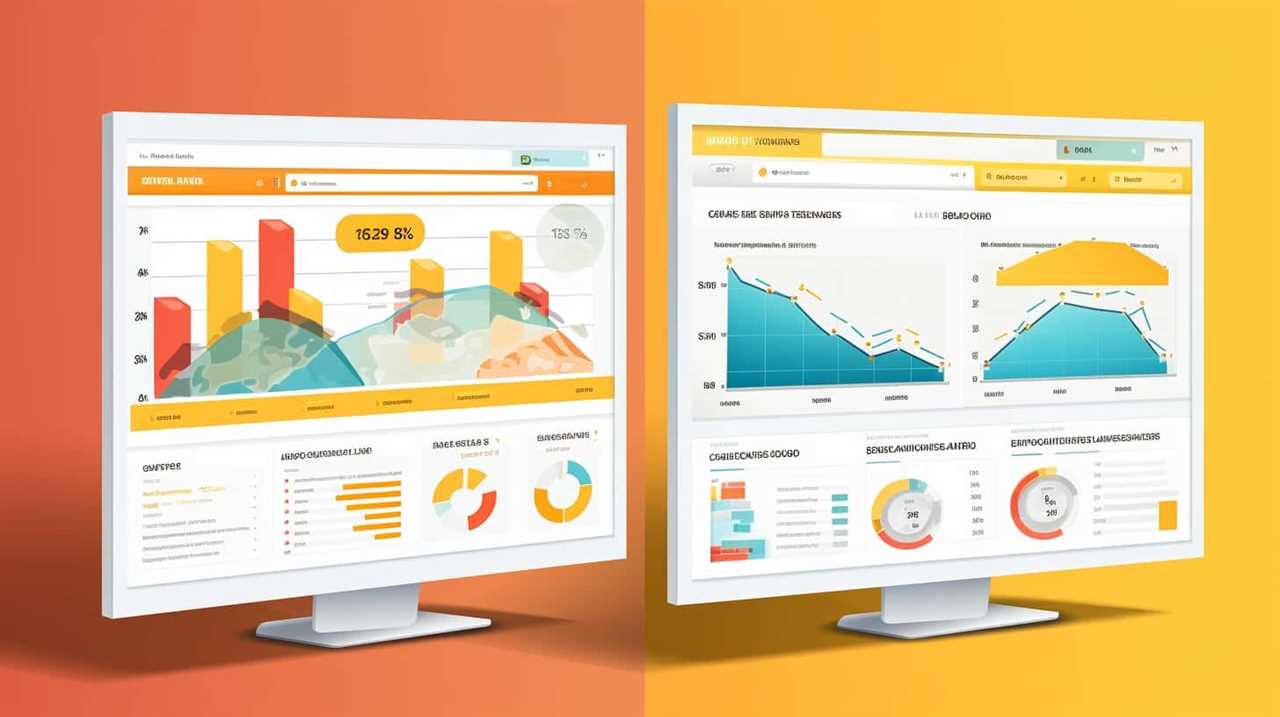Keyword Research
The Essential Blueprint for an Effective Local SEO Strategy

Are you ready to excel in local SEO? Our team is here to guide you through the essential strategies needed for effective local SEO success.
In this article, we’ll show you how to navigate the local search landscape, conduct keyword research, optimize your website, claim your Google My Business listing, and much more.
Get ready to elevate your online presence and attract local customers.
Let’s dive in and take your local SEO game to the next level!

Key Takeaways
- Understanding local search trends and conducting keyword research helps identify commonly used keywords and phrases by the target audience.
- Optimizing your website for local search and claiming and optimizing your Google My Business listing improves search ranking and visibility.
- Building and managing online business listings with consistent information is crucial for optimizing local SEO strategy.
- Implementing a local link building strategy and leveraging social media for local SEO can boost visibility and credibility.
Understand the Local Search Landscape
To effectively navigate the local search landscape, we need to understand the various factors that influence local search results.
Local search trends and target audience analysis are crucial components of this understanding.
Local search trends refer to the patterns and behaviors of users when searching for local businesses or services. By analyzing these trends, we can identify the keywords and phrases commonly used by our target audience, allowing us to optimize our content and increase visibility in local search results.
Additionally, conducting a thorough target audience analysis helps us gain insights into the demographics, preferences, and needs of our potential customers.

This knowledge enables us to tailor our local SEO strategy to effectively reach and engage our target audience, ultimately driving more traffic and conversions to our business.
Conduct Keyword Research for Local SEO
We can begin conducting keyword research for local SEO by identifying the key phrases commonly used by our target audience. This involves understanding local keyword trends and analyzing competitor strategies.
By researching the keywords that our potential customers are using when searching for products or services in our local area, we can optimize our website and content to ensure it ranks well in search results. It’s important to consider the specific geographic location we’re targeting and incorporate location-specific keywords into our strategy.
Additionally, analyzing our competitors’ keyword usage can provide valuable insights and help us uncover opportunities to differentiate ourselves. By staying up-to-date with local keyword trends and conducting thorough competitor analysis, we can develop a strong keyword strategy that will improve our local SEO efforts.

Optimize Your Website for Local Search
After conducting keyword research for local SEO, it’s now time to optimize our website for local search.
Local search optimization plays a crucial role in improving our local search ranking and increasing our visibility to potential customers in our target area.
To optimize our website, we need to focus on a few key areas.
Firstly, we should ensure that our website has a clear and concise title tag and meta description that includes relevant local keywords.

Additionally, we should optimize our website’s content by incorporating local keywords naturally throughout the pages.
It’s also important to include our business’s name, address, and phone number (NAP) on every page of our website, as this helps search engines associate our website with our local area.
Finally, we should create location-specific landing pages if we’ve multiple locations, each with unique content and local keywords.
Claim and Optimize Your Google My Business Listing
Now that we’ve optimized our website for local search, let’s move on to the next step in our local SEO strategy: claiming and optimizing our Google My Business listing. This is an essential step in boosting our online presence and attracting local customers.

Here’s how to do it:
- Verification Process: Start by claiming our Google My Business listing. This involves verifying our business’s information through a series of steps provided by Google. Once verified, we can access and manage our listing.
- Features and Updates: Explore the various features and updates offered by Google My Business. These include adding photos, videos, posts, and updates about our business. We can also interact with customers through reviews and messages.
- Optimization: Optimize our Google My Business listing by providing accurate and detailed information about our business. This includes our address, phone number, website, hours of operation, and a compelling business description.
Build and Manage Online Business Listings
Now let’s talk about the importance of building and managing online business listings.
When it comes to local SEO, optimizing your business listings is crucial for improving your online visibility.
Listing Optimization Techniques
To effectively build and manage online business listings, we prioritize optimizing their content and ensuring accurate information. Here are three listing optimization techniques that can help boost your local SEO strategy:

- Conduct keyword research: Identify the local search trends and keywords relevant to your business. Use these keywords strategically in your listing’s title, description, and other areas to increase visibility in local search results.
- Optimize listing content: Provide detailed and relevant information about your business, including name, address, phone number, website URL, and business hours. Use consistent formatting and ensure accuracy to enhance the credibility and visibility of your listing.
- Encourage customer reviews: Positive reviews can improve your local citation and online reputation. Encourage satisfied customers to leave reviews on your listing, and respond to both positive and negative feedback to demonstrate your commitment to customer satisfaction.
Importance of Consistent Information
Consistent information is crucial when it comes to building and managing online business listings. Maintaining accuracy in local directory listings is vital for optimizing your local SEO strategy. Consistency in NAP (Name, Address, Phone Number) information across all online platforms helps search engines understand and validate your business’s legitimacy and relevance. It also ensures that potential customers can find accurate and up-to-date information about your business, such as location, contact details, and operating hours.
Inaccurate or inconsistent information can lead to confusion and frustration for both search engines and potential customers. It can negatively impact your local search rankings and result in missed opportunities for attracting local customers. Therefore, it’s essential to regularly audit and update your business listings on various platforms, including search engines, social media, and online directories.
By maintaining consistent and accurate NAP information, you establish trust with search engines and potential customers, improving your chances of appearing in local search results.
This lays the foundation for the subsequent section, which discusses the use of local schema markup for enhanced search results.

Use Local Schema Markup for Enhanced Search Results
Implementing local schema markup is crucial for improving search results. Local schema markup is a form of structured data that provides search engines with additional information about your business, such as your address, phone number, and business hours. This helps search engines understand your website and display relevant information to users.
Here are three ways to enhance local schema markup for better visibility:
- Include accurate and up-to-date information: Ensure that your schema markup includes accurate and current details about your business, such as your address, phone number, and opening hours.
- Use specific schema types: Take advantage of schema types that are relevant to your business, such as LocalBusiness, Restaurant, or Service. This will help search engines categorize and display your business correctly.
- Leverage user-generated content: Encourage customers to leave reviews and ratings for your business. This user-generated content can be included in your schema markup, boosting your credibility and visibility in search results.
Generate Positive Online Reviews and Ratings
Enhancing local schema markup and leveraging user-generated content allows us to generate positive online reviews and ratings, boosting our credibility and visibility in search results. Customer testimonials have become a crucial element in local SEO strategies, as they provide valuable social proof and influence potential customers.
To generate customer testimonials, encourage satisfied customers to leave reviews on platforms such as Google My Business, Yelp, and industry-specific review sites. It’s also essential to respond to reviews promptly and professionally, addressing any concerns or issues raised by customers.

Embracing reputation management strategies is key to maintaining a positive online reputation. Regularly monitoring and addressing negative reviews can help mitigate their impact and showcase a commitment to customer satisfaction.
Implement a Local Link Building Strategy
When it comes to implementing a local link building strategy, we believe that quality should always outweigh quantity. Instead of focusing on getting as many links as possible, it’s important to prioritize building high-quality links from reputable and relevant websites.
Additionally, leveraging local business directories can be an effective way to improve your local SEO. By ensuring that your business is listed accurately and consistently across these directories, you can increase your online visibility and attract more local customers.
Quality Over Quantity
By focusing on building quality local links, we can significantly improve the effectiveness of our local SEO strategy.

Here are three reasons why quality matters when it comes to local link building:
- Relevance: When we obtain links from websites that are relevant to our business and industry, it signals to search engines that we’re a trusted and authoritative source. This increases our chances of ranking higher in local search results.
- Authority: Quality links from reputable local websites not only enhance our online visibility but also establish us as a trusted local business. This boosts customer satisfaction and increases local customer engagement.
- Long-term benefits: Building quality local links takes time and effort, but the results are worth it. These links are more likely to have a lasting impact on our local SEO efforts, helping us maintain a strong online presence for the long haul.
Local Business Directories
To implement an effective local link building strategy, we can leverage the power of local business directories.
Local business directories are online platforms that list businesses within a specific geographic area. They allow businesses to create a profile with important information such as name, address, phone number, and website.
These directories not only provide valuable visibility for local businesses but also serve as a source of backlinks. When other websites reference a business’s listing on a local directory, it creates a valuable link that can boost search engine rankings.

Proper citation management is crucial for local link building. This involves ensuring consistency in business information across all directories and regularly updating the listings.
Leverage Social Media for Local SEO
Social media plays a crucial role in enhancing local SEO strategies. When it comes to leveraging social media for local SEO, there are three key tactics that can make a significant impact:
- Social media engagement: Engaging with your audience on social media platforms can help boost your local SEO efforts. Responding to comments and messages, sharing relevant content, and encouraging user-generated content can all contribute to increased visibility and credibility for your local business.
- Influencer partnerships: Collaborating with influencers in your local area can help amplify your brand’s reach and visibility. By partnering with influencers who have a strong local following, you can tap into their audience and gain valuable exposure for your business.
- Local content promotion: Utilizing social media platforms to promote your local content is an effective way to improve your local SEO. Sharing blog posts, videos, and other content that’s specific to your local area can help attract local customers and improve your search engine rankings.
Localize Your Content Strategy
Our next step in maximizing the impact of our local SEO efforts is to localize our content strategy. Local content creation plays a crucial role in attracting and engaging our target audience. By tailoring our content to specific geographic locations, we can better connect with local customers and improve our search engine rankings. Geo targeted marketing allows us to create content that resonates with our local audience, addressing their unique needs and preferences. To illustrate the importance of localizing our content strategy, consider the following table:
| Benefits of Local Content Creation | ||
|---|---|---|
| Increased visibility in local search results | Enhanced brand reputation within the local community | Improved engagement and conversions from local customers |
Optimize Your Website for Mobile Users
When it comes to optimizing your website for mobile users, there are two key points to consider.

First, the importance of having a mobile-friendly design can’t be overstated. With more and more people accessing the internet through their mobile devices, having a website that’s easy to navigate and view on a small screen is crucial.
Second, implementing a responsive web design can bring numerous benefits. This approach ensures that your website automatically adjusts its layout and content to fit different screen sizes, providing a seamless user experience across devices.
Mobile-Friendly Design Importance
To achieve optimal results with your local SEO strategy, it’s imperative to prioritize the importance of optimizing your website for mobile users. Mobile optimization is more crucial than ever, as the majority of internet users now access the web through their mobile devices. Here are three reasons why mobile-friendly design is essential for your website:
- Enhanced user experience: A mobile-friendly website ensures that users can easily navigate and interact with your content, leading to a positive user experience. This improves the likelihood of visitors staying on your site longer and engaging with your business.
- Higher search rankings: Search engines prioritize mobile-friendly websites in their rankings. By optimizing your website for mobile users, you increase your chances of appearing higher in search engine results, driving more organic traffic to your site.
- Increased conversion rates: Mobile-friendly design can significantly impact your conversion rates. When users have a seamless experience on your mobile site, they’re more likely to take the desired action, such as making a purchase or contacting your business.
Optimizing your website for mobile users is just the first step towards an effective local SEO strategy. Now, let’s explore the benefits of responsive web design.

Responsive Web Design Benefits
By implementing responsive web design, we can optimize our website for mobile users, ensuring a seamless browsing experience across all devices. Responsive web design adapts the layout and content of a website to fit different screen sizes and resolutions, providing a user-friendly interface on smartphones, tablets, and desktops. This approach offers several advantages. Firstly, it improves user experience by eliminating the need for horizontal scrolling or zooming in and out. Secondly, it increases website visibility and accessibility, as responsive websites are favored by search engines and have higher chances of ranking well in search results. Lastly, responsive web design trends are constantly evolving to meet the changing needs of mobile users, ensuring that your website remains up-to-date and competitive.
| Advantages of Responsive Web Design |
|---|
| Enhanced user experience |
| Improved search engine optimization |
| Future-proof and adaptable |
Monitor and Analyze Your Local SEO Performance
To effectively monitor and analyze our local SEO performance, we need to consistently track key metrics and analyze the data for insights and opportunities for improvement. Here are three important steps to help us monitor and analyze our local SEO performance:
- Track online reputation: Monitoring online reviews and ratings is crucial for maintaining a positive online reputation. By regularly checking and responding to customer feedback, we can address any issues and improve our overall reputation.
- Conduct competitor analysis: It’s essential to keep an eye on our competitors’ local SEO strategies. By analyzing their tactics, keywords, and rankings, we can identify areas where we can outperform them and gain a competitive edge.
- Measure key metrics: Tracking metrics such as website traffic, conversion rates, and keyword rankings allows us to evaluate the effectiveness of our local SEO efforts. This data provides insights into what’s working and what needs improvement.
Stay up to Date With Local SEO Best Practices
As we strive to stay up to date with local SEO best practices, it’s important to understand that algorithm changes can have a significant impact on our rankings. It’s crucial to stay informed and adapt our strategies accordingly.
Additionally, consistency across platforms, such as NAP (Name, Address, Phone Number) information, is vital for local SEO success.

Lastly, we can’t underestimate the importance of online reviews, as they can greatly influence consumers’ decision-making process.
Algorithm Changes Impact Rankings
Our local SEO rankings are directly influenced by algorithm changes, so it’s crucial for us to stay up to date with the best practices in local SEO. Algorithm changes can have a significant impact on our local SEO rankings, so it’s important to understand how to adapt and thrive in this dynamic landscape.
Here are three strategies for dealing with algorithm changes in local SEO:
- Stay informed: Keep a close eye on industry news, updates, and discussions to stay ahead of algorithm changes. Subscribe to reliable sources and follow industry experts who provide insights and analysis.
- Analyze data: Regularly monitor and analyze our website’s performance metrics, such as organic traffic, keyword rankings, and conversion rates. This data can help identify any negative impacts from algorithm changes and guide adjustments to our local SEO strategy.
- Diversify our approach: Instead of relying solely on one tactic or channel, diversify our local SEO strategy. Focus on creating high-quality content, building a strong online reputation, optimizing for mobile devices, and engaging with our local community through social media and online directories.
Consistency Across Platforms
Ensuring consistency across platforms is essential for maintaining an effective local SEO strategy.

Consistency optimization involves managing your online presence across various platforms, such as search engines, social media, and online directories. It’s crucial to keep your business information up to date and accurate on all platforms to ensure that search engines and potential customers can easily find and trust your business.
Platform management plays a vital role in maintaining consistency, as it involves monitoring and updating your business information regularly. This includes your business name, address, phone number, website URL, and other relevant details.
Importance of Online Reviews
Are online reviews a crucial factor for staying up to date with local SEO best practices? Absolutely. Customer feedback plays a vital role in determining the success of any business, and online reviews are a powerful tool for gathering this feedback.
Here are three reasons why online reviews are important for managing your online reputation and staying on top of local SEO:

- Trust factor: Positive reviews build trust and credibility with potential customers. When people see positive feedback from others, they’re more likely to choose your business over competitors.
- SEO boost: Online reviews can improve your search engine rankings. Search engines like Google consider reviews as a ranking factor, so having a high quantity and quality of reviews can help your business appear higher in search results.
- Feedback for improvement: Online reviews provide valuable insights into what customers love about your business and areas where you can improve. By listening to customer feedback, you can make necessary adjustments to enhance your products or services.
Managing online reviews and leveraging them for local SEO is crucial for business success. By using effective strategies for managing your online reputation, you can ensure that your business is seen in a positive light and attract more customers.
Utilize Online Advertising for Local Targeting
We frequently use online advertising to effectively target local audiences. Implementing the right online advertising strategies can greatly enhance the visibility of your business among local customers. Here are some key strategies to consider:
| Online Advertising Strategies | Targeting Local Customers |
|---|---|
| Search Engine Advertising | Target customers based on their location and search intent. |
| Display Advertising | Use geotargeting to display ads to users in specific locations. |
| Social Media Advertising | Leverage audience targeting options to reach local users. |
Develop a Strong Local SEO Action Plan
To create a strong local SEO action plan, our focus should be on optimizing our online presence to attract local customers and improve our visibility in the local market. Here are three key steps to help us develop a comprehensive local SEO strategy and effectively track and measure our local SEO performance:
- Conduct local keyword research: Identify the keywords that local customers are using to search for products or services in our area. Include location-specific terms to target the right audience.
- Optimize our website for local search: Ensure our website includes relevant local information such as our address, phone number, and service areas. Also, optimize meta tags, headings, and content with local keywords.
- Claim and optimize our Google My Business listing: This is crucial for local SEO success. Fill out all the information, including our address, phone number, and business hours. Encourage customers to leave reviews and respond to them promptly.
Frequently Asked Questions
How Can I Stay up to Date With the Best Practices for Local Seo?
To stay up to date with Local SEO best practices and optimization tips, we rely on reputable industry sources, attend conferences, and constantly experiment. It’s crucial to stay informed and adapt to the ever-evolving landscape.

What Are Some Online Advertising Strategies That Can Be Used for Local Targeting?
Online targeting strategies are essential for effective advertising techniques. By utilizing methods such as geotargeting, local keyword research, and location-based ad platforms, businesses can maximize their reach to local audiences and boost their visibility.
How Can I Develop a Strong Action Plan for Local Seo?
We can develop a strong action plan for local SEO by targeting keywords and optimizing our Google My Business profile. This will help us improve our online visibility and attract more local customers.
What Are the Key Elements to Consider When Optimizing a Website for Mobile Users in the Context of Local Seo?
When optimizing a website for mobile users in the context of local SEO, key elements to consider include mobile optimization techniques, user-friendly design, local search integration, and responsive content for better user experience.
What Are Some Effective Ways to Generate Positive Online Reviews and Ratings for My Local Business?
To generate positive online reviews and ratings for our local business, we focus on generating customer testimonials and leveraging social media for reviews. This helps us build credibility and attract more customers.

Conclusion
In conclusion, developing an effective local SEO strategy is crucial for businesses looking to thrive in their local market.
By understanding the local search landscape, conducting keyword research, optimizing your website and Google My Business listing, and monitoring performance, you can improve your online visibility and attract more local customers.
Just like a well-built blueprint guides the construction of a sturdy building, a well-executed local SEO strategy lays the foundation for business success in the digital world.
Keyword Research
4 Best Keyword Research Tips for Creative Industries

Having trouble finding the perfect keywords for your art field? Search no more! Our top four tips for conducting keyword research provide all the information you need.
Understanding your target audience is key, so let’s dive in and brainstorm relevant keywords.
Don’t forget to utilize powerful keyword research tools to enhance your strategy.
And finally, analyze and refine your keyword list to ensure optimal results.
Get ready to master the art of keyword research in the creative world!
Key Takeaways
- Understanding the target audience is crucial in keyword research for creative industries.
- Brainstorming relevant keywords can be done through competitor analysis, customer feedback, industry trends, and social media.
- Keyword research tools provide valuable insights and data, helping uncover hidden opportunities and understand customer intent.
- Analyzing and refining the keyword list by incorporating long tail and localized keywords can maximize SEO efforts in creative industries.
Understand Your Target Audience
In this article, we’ll explore the importance of understanding our target audience in conducting effective keyword research for creative industries.
Understanding consumer behavior and identifying market trends are crucial steps in developing a successful keyword strategy. By gaining insights into our target audience, we can tailor our keywords to align with their preferences and needs. This understanding allows us to create content that resonates with our audience and drives relevant traffic to our websites.
By analyzing consumer behavior, such as their search patterns and preferences, we can identify the keywords that are most likely to attract our target audience. Additionally, staying updated on market trends helps us anticipate changes in consumer demand and adjust our keyword strategy accordingly.
Ultimately, understanding our target audience is the foundation of effective keyword research in creative industries.
Brainstorm Relevant Keywords
To effectively brainstorm relevant keywords for creative industries, we need to collaborate and explore various ideas as a team. Keyword expansion techniques and long tail keyword opportunities can help us expand our keyword list and target a wider range of potential customers.
Here are four strategies to consider:
- Conduct competitor analysis: Study the keywords used by your competitors to gain insights and identify new keyword possibilities.
- Use customer feedback: Review customer reviews, comments, and inquiries to uncover keywords that reflect their needs and interests.
- Analyze industry trends: Stay up-to-date with the latest trends in your creative industry and incorporate relevant keywords into your list.
- Leverage social media: Monitor social media conversations related to your industry to discover popular keywords and phrases.
By implementing these strategies, we can generate a comprehensive list of relevant keywords that will enhance our online visibility and attract our target audience.
Now, let’s explore how we can use keyword research tools to refine our keyword selection and maximize our SEO efforts.
Use Keyword Research Tools
Now let’s explore how we can leverage keyword research tools to further enhance our keyword selection and maximize our SEO efforts in the creative industries.
Keyword research tools provide valuable insights and data that can help us identify the most relevant and high-performing keywords for our artistic industries and design businesses. These tools offer features such as keyword suggestions, search volume data, competition analysis, and trend tracking.
By using these tools, we can uncover hidden opportunities, understand customer intent, and optimize our website content accordingly. Additionally, keyword research tools enable us to stay updated with the latest trends and search patterns in our industries, allowing us to adapt our SEO strategies accordingly.
Analyze and Refine Your Keyword List
Now, let’s delve into analyzing and refining our keyword list to ensure that we’re targeting the most effective and relevant keywords for our creative industries.
To optimize our keyword list, we should focus on incorporating long tail keywords. These are specific keyword phrases that are more likely to attract our target audience and have less competition. By including these long tail keywords, we can increase our chances of ranking higher on search engine result pages.
Additionally, it’s crucial to incorporate localized keywords for targeted marketing. This means including keywords that are specific to our target geographic location, helping us reach potential customers in our area.
Frequently Asked Questions
How Can I Effectively Use Social Media to Research Keywords for My Creative Industry?
To effectively use social media for keyword research in our creative industry, we leverage influencer collaborations and utilize user-generated content. These strategies provide valuable insights into the keywords that resonate with our target audience and drive engagement.
Are There Any Specific Techniques or Strategies to Find Long-Tail Keywords in the Creative Industry?
When finding niche keywords, it’s important to consider the value of long-tail keywords in the creative industry. We can employ specific techniques and strategies to uncover these valuable keywords for maximum impact and success.
What Are Some Common Mistakes to Avoid When Conducting Keyword Research for Creative Industries?
When it comes to keyword research for creative industries, avoiding common mistakes is crucial. By understanding how to avoid keyword research pitfalls in the creative industry, we can optimize our strategies and achieve mastery.
How Can I Ensure That My Keyword Research Aligns With Current Trends in the Creative Industry?
To ensure our keyword research aligns with current trends in the creative industry, we emphasize the importance of data analysis and staying ahead of the competition by identifying emerging trends.
Are There Any Alternative Keyword Research Methods That Are Specific to the Creative Industry?
Yes, there are alternative keyword research tools tailored specifically to the unique challenges of the creative industry. These tools can help us uncover trending keywords and optimize our content for maximum visibility.
How Can Holistic SEO Benefit Fashion Designers?
Holistic seo strategies for fashion designers can greatly benefit their online presence and overall brand success. By implementing these strategies, designers can ensure their website is optimized for search engines, driving organic traffic and increasing visibility. From keyword research and on-page optimization to holistic link building and content creation, fashion designers can establish a strong online presence, reaching their target audience effectively. Ultimately, holistic SEO strategies contribute to higher website rankings, brand authority, and increased sales for fashion designers.
Conclusion
In the world of creative industries, understanding your target audience and using relevant keywords is crucial for success. By utilizing keyword research tools and analyzing your keyword list, you can refine your content to reach the right audience.
Remember, keywords are like a secret language that connects you with your desired audience, so choose them wisely.
With these tips, you can unlock the door to reaching and captivating your target audience, leading to greater success in the creative industries.
Keyword Research
How to Keyword Search Excel

Struggling to locate specific data in Excel? You’re in the right place!
In this article, we will guide you through the process of keyword searching in Excel. We will show you how to utilize the search function effectively, employ advanced options, and use filters to refine your search results.
Additionally, we will share tips and tricks, including the use of macros, to enhance your keyword searching skills.
Get ready to master Excel’s search capabilities!
Key Takeaways
- Excel’s search function allows users to quickly find and navigate through large amounts of data.
- Utilizing advanced search options like wildcards, match case, and search by format enhances the process of finding specific keywords within a spreadsheet.
- Applying filters in Excel allows users to specify criteria to determine which rows of data are displayed, narrowing down search results.
- Employing macros in Excel streamlines the keyword searching process, automating it and saving time and effort.
Understanding Excel’s Search Function
In this section, we’ll explore the functionality of Excel’s search function and how it can be used to efficiently locate specific keywords within a spreadsheet.
Excel’s search function is a powerful tool that allows users to quickly find and navigate through large amounts of data.
One useful feature of the search function is the ability to use wildcard characters. Wildcard characters, such as the asterisk (*) and question mark (?), can be used to represent unknown or variable characters in a keyword search. This can greatly enhance the search capabilities and flexibility in Excel.
Another efficient way to search for keywords in Excel is by utilizing the ‘Find and Replace’ feature. This feature allows users to not only find specific keywords, but also replace them if needed.
Utilizing Advanced Search Options in Excel
To effectively utilize advanced search options in Excel, we can employ various techniques to streamline the process of finding specific keywords within a spreadsheet. Here are three key ways to leverage these advanced search options:
- Excel’s search function: Excel’s search function allows users to search for keywords within a single sheet. Compared to other spreadsheet software, Excel provides a more robust and efficient search functionality.
- Searching in multiple sheets: Excel also enables users to search for keywords in multiple sheets. This feature is particularly useful when working with large datasets spread across multiple sheets, as it allows for a comprehensive search across the entire workbook.
- Advanced search options: Excel offers advanced search options like wildcards, match case, and search by format. These options allow users to refine their searches and find specific keywords with greater precision.
Using Filters to Narrow Down Search Results in Excel
We can further narrow down search results in Excel by applying filters. Filtering data in Excel allows us to specify criteria that will determine which rows of data are displayed. By using filters, we can easily find and analyze specific information within a large dataset.
To apply a filter in Excel, follow these steps:
- Select the range of data you want to filter.
- Go to the Data tab and click on the Filter button.
- A dropdown arrow will appear next to each column header. Click on the arrow to display the filter options for that column.
Using filters in Excel gives us the ability to search for specific values, text, or even patterns using wildcards. Wildcards are special characters that represent unknown or variable characters. For example, the asterisk (*) can be used to represent any number of characters, while the question mark (?) represents a single character. By using wildcards in Excel search, we can further refine our filters and find exactly what we’re looking for.
Employing Macros for Efficient Keyword Searching in Excel
When using filters to narrow down search results in Excel, we can further enhance our keyword searching efficiency by employing macros. Customizing search settings in Excel allows us to tailor our search criteria to specific needs, such as searching within a range of cells or ignoring case sensitivity.
Automating keyword search using VBA macros eliminates the need for manual searching, saving time and effort. With macros, we can set up automated processes to search for keywords across multiple worksheets or workbooks, generating instant results.
By using macros, we can streamline our keyword searching process and ensure accurate and efficient results.
In the next section, we’ll discuss some tips and tricks for effective keyword search in Excel, building upon the techniques we’ve already explored.
Tips and Tricks for Effective Keyword Search in Excel
How can we further enhance our keyword searching efficiency in Excel?
One way is by using wildcard characters for more precise keyword searches. Wildcards are special characters that represent unknown or variable characters in a search string. For example, the asterisk (*) represents any number of characters, while the question mark (?) represents a single character. By incorporating these wildcard characters into our search queries, we can broaden or narrow down our search results as needed.
Another technique to consider is creating custom search formulas in Excel. These formulas allow us to specify specific keywords or conditions to search for within our data. For instance, we can use the COUNTIF function to count the number of occurrences of a particular keyword in a range of cells. By utilizing these custom search formulas, we can quickly and accurately locate the information we need.
Frequently Asked Questions
Can I Search for Specific Formatting Options, Such as Bold or Italicized Text, in Excel Using Keyword Search?
Yes, we can use advanced search options in Excel to find specific formatting styles like bold or italicized text. We can also use wildcard characters in keyword searches to refine our search results.
Is It Possible to Search for Keywords Within Only a Specific Range of Cells in Excel?
Yes, it is possible to search for keywords within a specific range of cells in Excel. By using advanced filtering techniques and incorporating wildcard characters, you can enhance your keyword searches for more precise results.
How Can I Search for Keywords in Excel and Have the Search Results Display in a Separate Sheet?
We can use advanced filtering techniques in Excel to search for keywords and display the results in a separate sheet. Additionally, we can automate this process using VBA macros for efficient and seamless keyword searching.
Can I Search for Keywords in Excel and Have the Search Results Automatically Update as New Data Is Added?
Yes, we can search for keywords in Excel and have the search results update automatically. One way is to use conditional formatting to highlight specific keywords. Another advanced technique is using wildcards or regular expressions for keyword searching.
Is There a Way to Search for Keywords in Excel and Have the Search Function Ignore Certain Cells or Columns in the Search Process?
Yes, there are filtering options and advanced search techniques in Excel to refine keyword searches. These options allow the search function to ignore specific cells or columns, providing more precise and targeted search results.
Conclusion
In conclusion, mastering the art of keyword searching in Excel can unlock a treasure trove of data.
By understanding Excel’s search function and utilizing advanced search options, filters, and macros, users can efficiently find and analyze specific information within their spreadsheets.
With these tips and tricks at your disposal, navigating through vast amounts of data becomes as smooth as a gentle breeze on a sunny day.
So seize the power of Excel’s keyword search and let your data exploration soar to new heights.

Keyword Research
How to Keyword Search a Website

Ready to uncover the secrets of successful keyword searching on your website? We’re here to help!
In this article, we’ll guide you through the process step-by-step, ensuring that you gain a thorough understanding of the importance of keyword research.
We’ll show you how to choose the right keywords, utilize powerful search tools and techniques, and implement on-page optimization strategies that will elevate your website’s visibility.
Get ready to master the art of keyword searching and take your website to new heights!
Key Takeaways
- Keyword research is crucial for optimizing website content and improving search engine rankings.
- Long tail keywords can attract more targeted traffic to a website.
- Balancing keyword usage and incorporating long tail keywords can increase the chances of ranking higher.
- Analyzing and adjusting keyword strategy regularly is essential for success.
Understanding the Importance of Keyword Research
Keyword research is vital for optimizing website content and improving search engine rankings. It plays a crucial role in SEO by helping us understand the behavior of our target audience and the language they use when searching for information online.
One aspect of keyword research that shouldn’t be overlooked is the role of long tail keywords in SEO. These are highly specific and less competitive keywords that can attract more targeted traffic to our website. By incorporating long tail keywords into our content, we can increase our chances of ranking higher in search engine results and attracting visitors who are more likely to convert.
Another important factor to consider is the impact of keyword density on search engine rankings. Keyword density refers to the number of times a keyword appears in relation to the total number of words on a webpage. While it’s important to include keywords in our content, we must also be mindful of overusing them, as this can be seen as spammy by search engines. Striking the right balance is key to optimizing our website for search engine rankings.
Choosing the Right Keywords for Your Website
Now, let’s delve into the process of selecting the most appropriate keywords for our website, leveraging the insights gained from our previous discussion on keyword research. When choosing keywords, it’s important to consider their relevance, search volume, and competition.
Here are some key points to keep in mind:
- Keyword Research: Start by conducting thorough keyword research to identify relevant keywords that align with your website’s content and target audience.
- Long Tail Keywords: Incorporate long tail keywords, which are more specific and have lower competition. They help target a niche audience and can improve your website’s visibility in search results.
- Keyword Density: Maintain an optimal keyword density by strategically placing keywords throughout your website’s content. Avoid keyword stuffing, as it can negatively impact your website’s ranking.
- Competitor Analysis: Analyze the keywords used by your competitors to gain insights and identify potential opportunities.
- Regular Evaluation: Continuously monitor and evaluate the performance of your chosen keywords. Make necessary adjustments based on changes in search trends and your website’s goals.
Utilizing Keyword Search Tools and Techniques
After conducting thorough keyword research, we can now explore the utilization of various keyword search tools and techniques to further optimize our website.
Keyword research tools play a crucial role in identifying the most relevant and high-performing keywords for our website. These tools provide valuable insights into search volume, competition, and potential traffic.
By using keyword research tools such as Google Keyword Planner, SEMrush, or Ahrefs, we can identify popular keywords that align with our target audience and industry.
Once we’ve selected the right keywords, we can then focus on optimizing our website content by strategically incorporating these keywords into our titles, headings, meta descriptions, and body text. This will help improve our website’s visibility, attract relevant traffic, and ultimately drive conversions.
Implementing Effective On-Page Optimization Strategies
To optimize our website for better search engine rankings, we implement effective on-page optimization strategies. By implementing SEO best practices, we can maximize website traffic and attract more organic visitors. Here are five key strategies to consider:
- Optimize page titles and meta descriptions: Craft compelling and keyword-rich titles and descriptions to improve click-through rates and search engine visibility.
- Use relevant keywords in content: Research and incorporate relevant keywords naturally throughout your content to improve relevance and search visibility.
- Optimize URL structure: Use descriptive and keyword-rich URLs to help search engines understand the content of your pages.
- Improve site speed: Optimize images, minify code, and leverage caching techniques to enhance site speed, which can positively impact search rankings.
- Mobile optimization: Ensure your website is mobile-friendly to cater to the increasing number of users accessing the internet through mobile devices.
Analyzing and Adjusting Your Keyword Strategy for Success
In order to achieve success with your keyword strategy, it’s essential to analyze and adjust it regularly. One important aspect of analysis is to examine competitor keywords. By understanding what keywords your competitors are targeting, you can gain insights into their strategies and identify opportunities for improvement in your own approach.
Additionally, incorporating long tail keywords can be highly beneficial. These are longer, more specific phrases that often have lower search volume but higher conversion rates. By incorporating long tail keywords into your strategy, you can target a more niche audience and increase the likelihood of attracting qualified leads.
To ensure continued success, it’s important to monitor the performance of your keywords and make adjustments as needed. Remember, analyzing and adjusting your keyword strategy is an ongoing process that requires dedication and attention to detail.
Frequently Asked Questions
How Do I Track the Performance of Keywords on My Website?
To track the performance of keywords on our website, we analyze keyword data. This helps us understand which keywords are driving traffic and conversions. By monitoring their performance, we can optimize our SEO strategy for better results.
Are There Any Alternative Methods to Keyword Research?
There are alternative keyword research methods available that can be used in addition to traditional website keyword search. It is important to compare different keyword search tools to find the most effective one for your needs.
What Are the Best Practices for Optimizing Images on a Website?
What are the best practices for optimizing images on a website? We can improve loading speed with image compression techniques and enhance accessibility by using descriptive alt text for better image optimization.
How Can I Improve My Website’s Loading Speed for Better Search Engine Rankings?
To improve our website’s loading speed for better search engine rankings, we can implement various strategies for increasing website speed and performance. Optimizing images, minifying code, and utilizing caching techniques are effective ways to achieve this goal.
What Are Some Common Mistakes to Avoid in Keyword Optimization?
When it comes to keyword optimization, there are common mistakes to avoid. It’s important to effectively use long tail keywords to enhance search engine rankings and drive targeted traffic to your website.
Conclusion
In conclusion, keyword research is a critical aspect of website optimization.
By choosing the right keywords and utilizing effective search tools and techniques, you can improve your website’s visibility and attract more organic traffic.
Implementing on-page optimization strategies further enhances your chances of success.
Remember to regularly analyze and adjust your keyword strategy to stay ahead of the competition.
So, let’s go out there and turn our websites into keyword superheroes, saving the day with relevant and high-ranking content!
-

 Expert Content Authority3 months ago
Expert Content Authority3 months agoThe Pillar of SEO: Why Content Consistency Matters Most
-

 Learning Center3 months ago
Learning Center3 months agoUncover How To Use ChatGPT to Write Effective Ad Copy
-

 Learning Center3 months ago
Learning Center3 months agoAI in 2024: 10 Things We are NOT Looking Forward To
-

 Holistic SEO1 hour ago
Holistic SEO1 hour agoHolistic Local SEO Tactics for Small Businesses
-

 Learning Center3 months ago
Learning Center3 months agoOptimize Your Digital Experience with Akamai CDN
-

 Learning Center3 months ago
Learning Center3 months agoUnbiased RankerX Review: A Deep Dive into Its SEO Capabilities
-

 Holistic SEO3 months ago
Holistic SEO3 months agoMoney Robot Review [2024]
-

 Learning Center3 months ago
Learning Center3 months agoExperience How GPT-4 Turbo Beats Claude 2: A Review
















